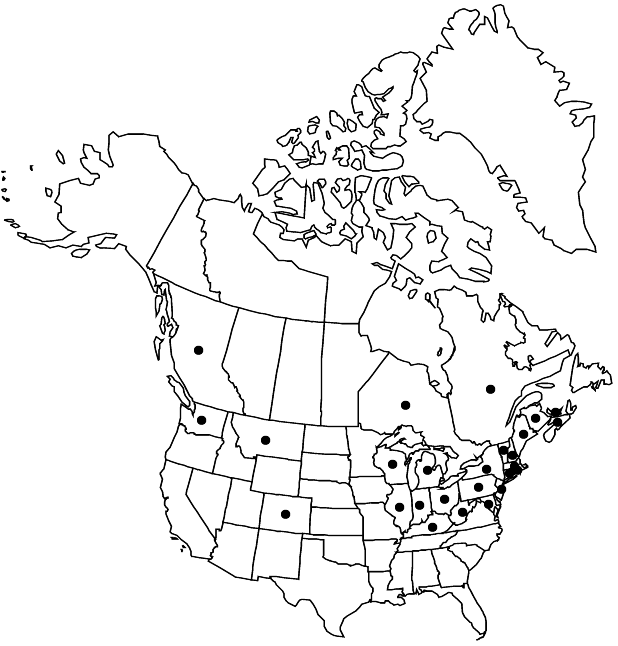Difference between revisions of "Lysimachia vulgaris"
Sp. Pl. 1: 146. 1753 ,.
FNA>Volume Importer |
imported>Volume Importer |
||
| (5 intermediate revisions by 2 users not shown) | |||
| Line 7: | Line 7: | ||
}} | }} | ||
|common_names=Garden loosestrife;lysimaque commune | |common_names=Garden loosestrife;lysimaque commune | ||
| + | |special_status={{Treatment/ID/Special_status | ||
| + | |code=W | ||
| + | |label=Weedy | ||
| + | }}{{Treatment/ID/Special_status | ||
| + | |code=I | ||
| + | |label=Introduced | ||
| + | }} | ||
|basionyms= | |basionyms= | ||
|synonyms= | |synonyms= | ||
| Line 23: | Line 30: | ||
|elevation=0-300 m | |elevation=0-300 m | ||
|distribution=B.C.;N.B.;N.S.;Ont.;P.E.I.;Que.;Colo.;Conn.;Ill.;Ind.;Ky.;Maine;Md.;Mass.;Mich.;Mont.;N.H.;N.J.;N.Y.;Ohio;Pa.;R.I.;Vt.;Wash.;W.Va.;Wis.;Europe. | |distribution=B.C.;N.B.;N.S.;Ont.;P.E.I.;Que.;Colo.;Conn.;Ill.;Ind.;Ky.;Maine;Md.;Mass.;Mich.;Mont.;N.H.;N.J.;N.Y.;Ohio;Pa.;R.I.;Vt.;Wash.;W.Va.;Wis.;Europe. | ||
| + | |introduced=true | ||
|tables= | |tables= | ||
|references= | |references= | ||
| Line 31: | Line 39: | ||
-->{{#Taxon: | -->{{#Taxon: | ||
name=Lysimachia vulgaris | name=Lysimachia vulgaris | ||
| − | |||
|authority=Linnaeus | |authority=Linnaeus | ||
|rank=species | |rank=species | ||
| Line 46: | Line 53: | ||
|publication title=Sp. Pl. | |publication title=Sp. Pl. | ||
|publication year= | |publication year= | ||
| − | |special status= | + | |special status=Weedy;Introduced |
| − | |source xml=https:// | + | |source xml=https://bitbucket.org/aafc-mbb/fna-data-curation/src/2e0870ddd59836b60bcf96646a41e87ea5a5943a/coarse_grained_fna_xml/V8/V8_636.xml |
|genus=Lysimachia | |genus=Lysimachia | ||
|species=Lysimachia vulgaris | |species=Lysimachia vulgaris | ||
Latest revision as of 22:45, 5 November 2020
Stems erect, simple or branched, 1–12(–25) dm, pubescent and sometimes obscurely stipitate-glandular distally; rhizomes thickened; bulblets absent. Leaves whorled, opposite, or subopposite; petiole 0.1–0.6 cm, eciliate; blade lanceolate to lanceolate-ovate, 7–12 × 1.5–4 cm, base truncate, obtuse, or cuneate, sometimes slightly decurrent, margins entire or sometimes sinuate, slightly revolute or plane, eciliolate, apex acute to acuminate, surfaces obscurely punctate apically or along margins, pubescent abaxially and sometimes sparsely stipitate-glandular adaxially; venation pinnate to reticulate. Inflorescences terminal or terminal and axillary in distal leaves, panicles, 2–8 cm. Pedicels 2–7 mm, pubescent and sometimes also stipitate-glandular. Flowers: sepals 5, calyx streaked with longitudinal maroon resin canals along margins, 2.5–5 mm, pubescent and stipitate-glandular near margins, lobes ovate, margins thin or slightly thickened; petals 5, corolla yellow, sometimes with reddish base, not streaked, rotate, 8–12 mm, lobes with margins entire, apex acute to rounded, stipitate-glandular adaxially; filaments connate 1.5–2.2 mm, shorter than corolla; staminodes absent. Capsules (somewhat reddened distally), 3.5–6 mm, not punctate, glabrous. 2n = 28, 42, 56, 84 (Europe).
Phenology: Flowering summer.
Habitat: Gravelly stream banks, wet roadsides
Elevation: 0-300 m
Distribution

Introduced; B.C., N.B., N.S., Ont., P.E.I., Que., Colo., Conn., Ill., Ind., Ky., Maine, Md., Mass., Mich., Mont., N.H., N.J., N.Y., Ohio, Pa., R.I., Vt., Wash., W.Va., Wis., Europe.
Discussion
Selected References
None.